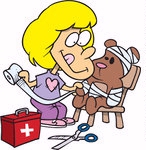 Preparing to Become a Caregiver
Preparing to Become a Caregiver
Caregiving is a twenty-four hour a day job. Those who decide to take on this enormous responsibility of providing care for loved ones often experience physical and emotional stress. Not only that, but sleep deprivation often causes fatigue and illness to caregivers. This article offers practical advice for family caregivers on how they can remain in control of their own lives while providing home care.
First, what is a caregiver? A caregiver is anyone who provides intensive, personal help to another person in need, usually a family member. The person being cared for often has a condition such as cancer, dementia, or brain injury. Because of their recipient's debilitated condition, caregivers help with many aspects of life, such as grocery shopping, house cleaning, cooking, paying bills, giving medicine, bathing, using the toilet, dressing, and eating.
Because of the time-intensive nature of such activities, many caregivers suffer from burnout and extreme stress. Here are a few tips that will help family caregivers cope with their role in their loved one's life.
1. Choose to be in control of your own life. Don't let your loved one's illness or disability always become the primary focus of every aspect of your life. You play an important role, but it is not the only one. The care you provide will be better if you take charge from the beginning.
2. Be good to yourself. You are committing to a very hard task and deserve some quality time once in a while--just for you. Remember to love, value, and honor yourself. Because of the strain and burnout often associated with caregiving, the healthy caregiver may experience deteriorating health due to the demands of caring for someone.
3. Keep an eye out for signs of depression in yourself, and do not put off getting help when you need it. This is an important part of being in control of your life and being good to yourself while you provide care.
4. Gain as much information as possible about your loved one's condition. The information you receive from pamphlets, professional Web sites, and informational books will empower you to do your very best and fight off discouragement.
5. Do not be afraid to look into technologies that promote your loved one's independence. You don't have to do everything, and sometimes just caring is not enough to make your loved one feel stable.
6. If someone offers to help you, always accept the offer. This will go a long way in decreasing risk of feeling overloaded and burned out. To get the most of the offer, suggest specific things the person can do and let them do it.
7. Seek out the support of other caregivers. You are not alone in this challenge, and many great groups exist where you can share your feelings, get insights and new ideas, and just know that you have someone supporting you.
Family Caregivers Network (http://family-caregivers.com/) is a community-based healthcare system that provides a full range of services in home care in Upper Bucks County. Rachel Spohn is a freelance writer.